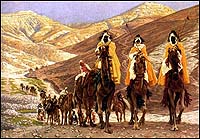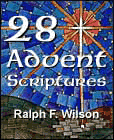Free E-Mail
Bible Studies
Beginning the Journey (for new Christians). en Español
Old Testament
Abraham
Jacob
Moses
Joshua
Gideon
David, Life of
Elijah
Psalms
Solomon
Songs of Ascent (Ps 120-135)
Isaiah
Advent/Messianic Scriptures
Daniel
Rebuild & Renew: Post-Exilic Books
Gospels
Christmas Incarnation
(Mt, Lk)
Sermon on the Mount
(Mt 5-7)
Mark
Luke's
Gospel
John's Gospel
7 Last Words of Christ
Parables
Jesus and the Kingdom
Resurrection
Apostle Peter
Acts
The Early Church
(Acts 1-12)
Apostle Paul
(Acts 12-28)
Paul's Epistles
Christ Powered Life (Rom 5-8)
1 Corinthians
2 Corinthians
Galatians
Ephesians
Vision for Church
(Eph)
Philippians
Colossians,
Philemon
1
& 2 Thessalonians
1 & 2 Timothy,
Titus
General Epistles
Hebrews
James
1 Peter
2 Peter, Jude
1, 2, and 3 John
Revelation
Revelation
Conquering Lamb of Revelation
Topical
Glorious Kingdom, The
Grace
Great Prayers
Holy Spirit, Disciple's Guide
Humility
Lamb of God
Listening for God's Voice
Lord's Supper
Names of God
Names of Jesus
Christian Art
About Us
Podcasts
Contact Us
Dr. Wilson's Books
Donations
Watercolors
Sitemap
Day 22. Wise Men from the East (Matthew 2:1-6)
Fourth Week of Advent
Depending on which day December 25th falls, Christmas could occur on any day this week, Monday through Saturday. On that day, use the reading for Christmas Day that you'll receive tomorrow along with your daily reading. You'll also be receiving a daily reading each day this coming week -- even though Christmas Day itself may have passed.
Sunday, Fourth Week of Advent
(Readings and prayers for lighting the Fourth Advent Candle are available in Appendix 1.)
 'The Journey of the Magi' (1894) by James Jacques Joseph Tissot (French painter and illustrator, 1836-1902), oil on canvas, Minneapolis Institute of Arts. |
Read in your Bible: Matthew 2:1-6
150 years ago John H. Hopkins, Jr. penned the words and music of this haunting carol of the wise men:
"We three kings of Orient are
bearing gifts, we traverse afar...."
They weren't kings. We're pretty sure of that. Nor were there necessarily three of them. Nor did they go by the names Caspar, Melchior, and Balthasar.160 But who were they and why did they come?
Who Are the Magi? (Matthew 2:1)
"After Jesus was born in Bethlehem in Judea, during the time of King Herod, Magi from the east came to Jerusalem and asked, 'Where is the one who has been born king of the Jews? We saw his star in the east and have come to worship him.'" (Matthew 2:1-2)
An elaborate entourage from the East appears in Jerusalem at Herod's court inquiring about the birth of the "King of the Jews." They are described as "wise men" (NRSV, KJV) or "Magi" (NIV). The word is magos, "a (Persian, then also Babylonian) wise man and priest, who was expert in astrology, interpretation of dreams, and various other occult arts."161 And they are from "the east,"162 the direction from which the sun rises. Where could that be? There are three main possibilities:
- Parthia or Persia. The term magoi was first associated with the Medes and the Persians and astrology flourished there.
- Babylon. The Babylonians or Chaldeans had a well-developed interest in astronomy and astrology and a large colony of Jews from whom the Magi could have learned of Jewish messianic expectations.
- Arabia or the Syrian desert. The gifts of gold, frankincense, and myrrh are associated with desert camel trains coming from Midian in northwest Arabia or Sheba in southwest Arabia.163
If I had to choose, I would guess they were from Babylon. As their caravan enters Jerusalem seeking a newborn king, they attract a great deal of attention.
What Kind of "Star" Did They See? (Matthew 2:2)
They ask,
"Where is the one who has been born king of the Jews? We saw his star in the east and have come to worship him." (Matthew 2:2)
"Star" isn't used here in a modern scientific sense. Rather it refers to "a luminous body (other than the sun) visible in the sky, star, single star, planet."164
So what is this "star"?
- A supernova or "new star," an explosion in an existing star that for several weeks or months gives out a great deal of light, sometimes even visible during the day. But there is no historical record of a supernova just before Jesus' birth date.
- A comet has always attracted human attention, with a spectacular tail and a nucleus made up of rock, dust, and ices. Halley's comet would have been visible 12-11 BC, years before Jesus' birth about 6 BC.
- A planetary conjunction. Astrologers pay attention to the planets. A conjunction of Jupiter, Saturn, and Mars that occurred in 7-6 BC, perhaps in the zodiacal constellation of Pisces, which may have been associated with the last days and with the Hebrews. But this is purely speculative, astrology by hindsight.165
You sometimes hear of scientists who have the Star of Bethlehem all figured out. But we just don't know enough to say exactly what the star really was. And as we'll see on Day 23, it has properties that distinguish it from any astronomical phenomenon known to man.
Elsewhere in Scripture, there is a star spoken of in the words of the errant prophet Balaam:
"I see him, but not now;
I behold him, but not near.
A star will come out of Jacob;
a scepter will rise out of Israel." (Numbers 24:17)
Could the messianic expectation based on this verse among Jewish communities in Babylon and Persia be the basis of the Magi's interpretation of the star? 166 We don't know.
Why Was Herod Disturbed? (Matthew 2:3)
"When King Herod heard this he was disturbed, and all Jerusalem with him." (Matthew 2:3)
A delegation of important people coming to Jerusalem to honor the king or to worship in the temple would not be uncommon. But the Magi's search for a newborn king based on an astronomical phenomenon caused quite a stir.167
Herod is troubled because he sees this newborn as a threat to his own throne. The people are troubled because they know what their paranoid king will do when he senses his throne threatened. Just the year before Jesus' birth, when afraid of intrigue among his many sons to replace him, Herod tried and executed two of them by strangulation about 7 BC.168 A third son was executed five days before Herod's death in 4 BC. Yes, Herod was troubled.
Where Was the Messiah to Be Born? (Matthew 2:4-6)
Herod takes the Magi's quest seriously.
"4 When he had called together all the people's chief priests and teachers of the law, he asked them where the Christ was to be born. 5 'In Bethlehem in Judea,' they replied, 'for this is what the prophet has written:
6 "But
you, Bethlehem, in the land of Judah,
are by no means least among the rulers of Judah;
for out of you will come a ruler
who will be the shepherd of my people Israel."'" (Matthew 2:4-6)
Notice that the Magi come seeking "the one who has been born king of the Jews" (Matthew 2:1). Herod asks the scholars where the Messiah (Greek Christos) will be born (Matthew 2:4). He understands immediately that this child they seek is no normal king, but Messiah himself. Messiah or not, this child must be destroyed.
An Independent Streak
 Also available in book formats: PDF, Kindle, and paperback. |
There is in us, as there was in Herod, an independent streak. We want to be in charge. We don't want someone telling us what to do -- even God. One of the marks of a disciple is the willingness to acknowledge Jesus as the Lord and King of our lives. To say that we believe in Jesus but to refuse to obey him is hypocrisy. Even more, it is rebellion, treason against the King of kings.
Christmas is a wonderful time to bend our knee before the King, and acknowledge him as the Lord of our lives. To do anything else than this is to go down Herod's road.
Prayer
Jesus, thank you for coming as Lord and King. Give us the grace to bow not only outwardly but in our hearts to your reign, and become loyal and willing subjects. Lead on, King Jesus. Amen.
Discussion Question
Q22. (Matthew 2:1-6) In what ways is the kingship of
Jesus a threat to our self-determination? What are our choices in light of his
Kingdom?
https://www.joyfulheart.com/forums/topic/2096-q22-magi/
Endnotes
[160] These names for the Magi in the West derive from an early 6th century Greek manuscript. Eastern churches and Armenians have different names for them.
[161] Magos, BDAG 608. Good discussions are included in Brown, Birth, 167 and Gerhard Delling, "magos, ktl." TDNT 4:356-59.
[162] The phrase "in the east" (NIV, KJV) in verses 2 and 9 may well carry the meaning "at its rising" (NRSV) or "when it rose" (ESV) and referring to the "upward movement of celestial bodies" (Anatolē, BDAG 74).
[163] Brown, Birth, pp. 168-170.
[164] Astēr, BDAG 145. Foerster notes, "astēr almost always denotes a single "star," whereas astron can also be used for a "constellation" (Werner Foerster, astēr, astron, TDNT 1:503-505).
[165] We don't have any evidence that such a conjunction of planets would have been actually referred to as a "star" (Brown, Birth, pp. 171-173).
[166] The initial reference seems to be to David. The Qumran community saw this prophecy as messianic and later Judaism considered the messianic claims of Simon bar Kochba ("son of the star," 132-135 AD). Brown, Birth, p. 195, fn. 47 gives references to the Qumran literature. See also R.K. Harrison, Numbers (Baker, 1992), pp. 321-324. In the book of Revelation Jesus says, "I am the Root and the Offspring of David, and the bright Morning Star" (Revelation 22:16). On the Messianic expectation in later Judaism, Foerster (TDNT 1:505) cites Strack and Billerbeck I, 13c, 17f.
[167] The passive of tarassō means to "be troubled, frightened, terrified" (BDAG 990-991).
[168] Josephus, Antiquities, xvi.10.6-11.8; Wars i.27.1-6. Harold W. Hoehner, "Herod," ISBE 2:688-698.
Copyright © 2025, Ralph F. Wilson. <pastor![]() joyfulheart.com> All rights reserved. A single copy of this article is free. Do not put this on a website. See legal, copyright, and reprint information.
joyfulheart.com> All rights reserved. A single copy of this article is free. Do not put this on a website. See legal, copyright, and reprint information.
 |

|
In-depth Bible study books
You can purchase one of Dr. Wilson's complete Bible studies in PDF, Kindle, or paperback format -- currently 48 books in the JesusWalk Bible Study Series.
Old Testament
- Abraham, Faith of
- Jacob, Life of
- Moses the Reluctant Leader
- Joshua
- Gideon
- David, Life of
- Elijah
- Psalms
- Solomon
- Songs of Ascent (Psalms 120-134)
- Isaiah
- 28 Advent Scriptures (Messianic)
- Daniel
- Rebuild & Renew: Post-Exilic Books
Gospels
- Christmas Incarnation (Mt, Lk)
- Sermon on the Mount (Mt 5-7)
- Luke's Gospel
- John's Gospel
- Seven Last Words of Christ
- Parables
- Jesus and the Kingdom of God
- Resurrection and Easter Faith
- Apostle Peter
Acts
Pauline Epistles
- Romans 5-8 (Christ-Powered Life)
- 1 Corinthians
- 2 Corinthians
- Galatians
- Ephesians
- Philippians
- Colossians, Philemon
- 1 & 2 Thessalonians
- 1 &2 Timothy, Titus
General Epistles
Revelation
Topical
